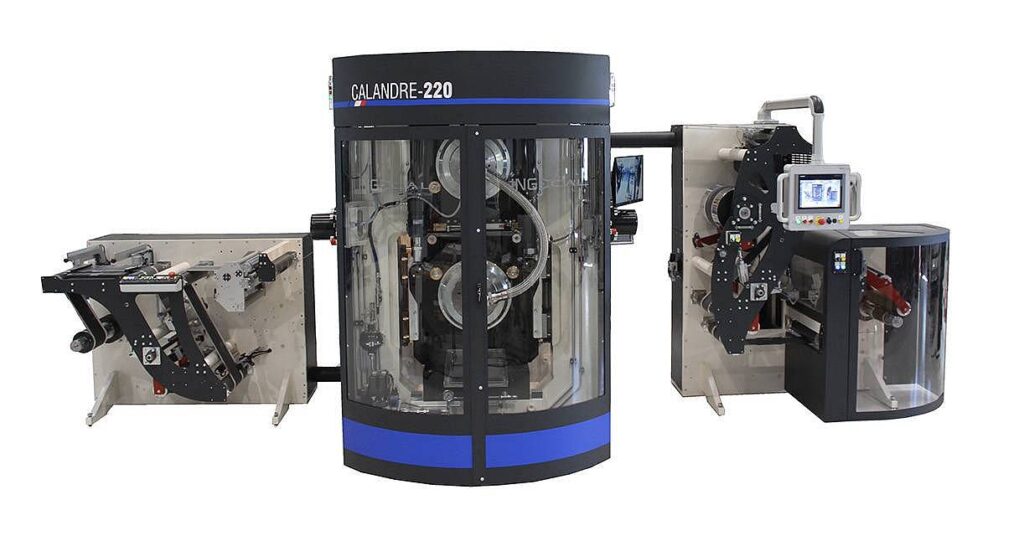
The Dürr Group has expanded its range in the growth business of production technology for battery electrodes to include an efficient and sustainable future-oriented technology. Thanks to its acquisition of the French mechanical engineering company Ingecal, Dürr can now also supply calendering systems to the battery industry. These play a key role in the coating of electrode foils for lithium-ion batteries. In addition, Dürr has agreed a partnership with the US coating expert LiCAP Technologies. With Ingecal and LiCAP, Dürr has unique expertise in electrode production and can now offer its customers not only wet coating but also cutting-edge dry coating technology. This process offers considerable advantages in terms of costs, energy consumption, and CO2 emissions and can also be used for the production of future solid-state batteries.
In the production of electrodes, thin metal foils are coated with cathode and anode material, which consists of chemicals. Today, this is commonly done using solvents. However, it is also possible to apply dry material without harmful solvents. This is a highly attractive option, both economically and in terms of sustainability, because dry coating requires up to 40% less energy and around 20% less process time. Furthermore, CO2 emissions are reduced by around 1 ton for every 10 kilowatt hours of electrode capacity produced.
Ingecal, which has been part of the Dürr Group since November 17 and is based near Lyon, specializes in calendering technology. In this process, the cathode and anode material is pressed onto the foil under high pressure, using two steel rollers. The French company’s calendering systems are suitable for both wet and dry coating. Ingecal is the main company of the Amalis Group, acquired by Dürr, with sales of approx. €15 million and around 70 employees. The purchase price is based on the enterprise value plus a performance-related component. In recent years, Dürr and Ingecal have successfully cooperated on several projects with battery manufacturers and automakers.
The partnership with LiCAP Technologies is aimed specifically at dry coating. The company from Sacramento (California) has extensive know-how regarding the material used and the requirements for the coating process. One result of LiCAP’s development work is the patented Activated Dry Electrode® process, which is now to be established on the market together with Dürr. Dürr and LiCAP are already in talks with a well-known battery cell manufacturer about the construction of a dry coating line.
Good growth opportunities through electromobility
Dr. Jochen Weyrauch, CEO of Dürr AG, said: “Given the strong growth in electromobility and the trend toward decentralized energy storage, battery production technology is one of the Dürr Group’s most important growth business fields. With Ingecal and LiCAP, we are offering our customers a comprehensive range of products for electrode production and are also well positioned in the future-oriented dry coating market. Ingecal and LiCAP are highly specialized partners with recognized expertise and an excellent reputation in the battery sector. Together we can perform even better – and this also goes for the construction of large coating systems for giga cell factories.”
The expansion of Dürr’s product portfolio also benefits its cooperation with mechanical engineering companies Grob and Manz, which has been running for a year now. This is primarily aimed at delivering turnkey equipment for complete gigafactories. “We now also offer calendering systems from a single source and, together, we can also target customers who rely on the dry process in the first step of electrode production,” said Dr. Jochen Weyrauch. In addition, thanks to its dry coating know-how, Dürr already has important expertise for the production of future solid-state batteries. These have solid electrolytes, unlike the currently prevalent lithium-ion batteries.
From around 2030, 30 to 40% of battery electrodes manufactured in Europe and North America are expected to be produced using dry coating. That said, wet coating will also remain a relevant process. Its further development is currently aimed primarily at replacing the toxic NMP solvents (N-methyl-2-pyrrolidone) used today with solvents that are largely harmless. For wet coating, Dürr offers not only coating technology but also systems for drying and solvent recovery. Dürr is already one of the world’s leading suppliers of solvent recovery systems. These will also be required in the future when using harmless solvent variants.










More Stories
Auto Repair Services: Keeping Your Vehicle Road-Ready
Unleashing Creativity with Vidnoz: The Best Free AI Video Generator in 2025
The Connection Between Air Drying and Energy Efficiency in Industrial Settings